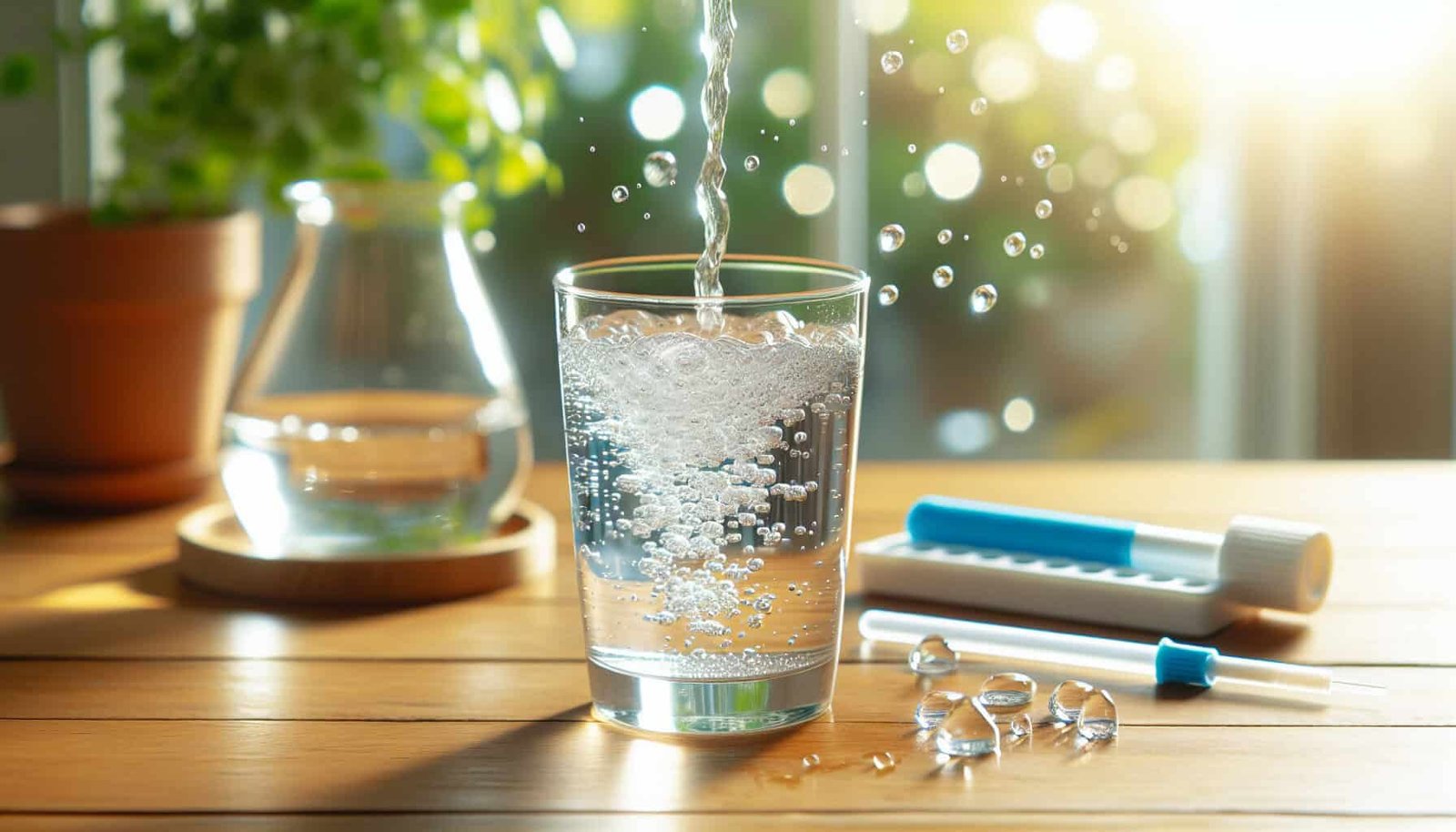If you’re a well owner and have concerns about the quality of your well water, specifically the presence of synthetic chemicals, you might be wondering where to access reliable resources for well water testing. Look no further! This article is here to guide you and provide the information you need to ensure the safety and purity of your well water.
Government Websites
United States Environmental Protection Agency (EPA)
The United States Environmental Protection Agency (EPA) is a government agency dedicated to protecting human health and the environment. Their website provides a wealth of information on well water testing for synthetic chemicals. You can access resources on how to test your well water, understand the potential risks of synthetic chemicals, and find guidelines on how to interpret test results. The EPA also provides information on the regulations and standards for drinking water quality, ensuring that you can make informed decisions about your well water.
Centers for Disease Control and Prevention (CDC)
The Centers for Disease Control and Prevention (CDC) is another valuable resource for well owners interested in testing for synthetic chemicals. The CDC’s website offers a comprehensive guide on well water testing and provides information on the potential health effects of various chemicals. They also offer guidance on how to interpret test results and take appropriate actions to address any contaminants found in your well water. Additionally, the CDC provides resources on well maintenance and proper well construction to minimize the risk of contamination.
Department of Environmental Quality (DEQ)
State-based Department of Environmental Quality (DEQ) websites are an essential resource for well owners seeking information on well water testing for synthetic chemicals specific to their location. These websites often provide state-specific guidelines and regulations on well water testing and monitoring programs. DEQ websites also offer information on how to obtain testing kits, contact local laboratories, and access additional resources for well owners. With the DEQ’s guidance, you can navigate the specific requirements and recommendations related to synthetic chemical testing in your state.
State Health Department Websites
State Health Department websites are another valuable resource for well owners looking for information on well water testing for synthetic chemicals. These websites often contain state-specific guidelines for well water testing, including recommendations for testing frequency, specific contaminants to look out for, and health-related information. State Health Department websites may also provide information on well water testing programs and resources available to well owners. By visiting these websites, you can gain a better understanding of the health risks associated with synthetic chemicals and learn how to safeguard your well water.
Nonprofit Organizations
National Ground Water Association (NGWA)
The National Ground Water Association (NGWA) is a nonprofit organization dedicated to the protection and responsible use of groundwater resources. Their website is a valuable resource for well owners interested in well water testing for synthetic chemicals. NGWA provides educational materials, publications, and webinars on well water testing, including the specific contaminants often associated with synthetic chemicals. They also offer resources on how to find reputable laboratories for testing and provide guidance on interpreting test results.
Water Systems Council (WSC)
The Water Systems Council (WSC) is another nonprofit organization that focuses on advocating for private well owners and protecting groundwater resources. Their website offers resources to help well owners understand the importance of well water testing for synthetic chemicals and provides guidance on how to interpret test results. WSC also provides information on well water treatment options and offers tools to locate local well professionals who can help with testing and treatment recommendations.
American Chemical Society (ACS)
The American Chemical Society (ACS) is a nonprofit organization committed to advancing the understanding and application of chemistry. While their website primarily focuses on scientific research and education, it provides valuable resources for well owners interested in the chemistry behind synthetic chemicals in well water. ACS offers publications, articles, and research papers that delve into the analysis and detection of various chemicals in water. By exploring their website, you can gain a deeper understanding of the chemical processes involved and the potential health risks associated with synthetic chemicals.
Environmental Working Group (EWG)
The Environmental Working Group (EWG) is a nonprofit organization dedicated to protecting human health and the environment. Their website offers extensive resources on well water testing for synthetic chemicals, providing well owners with information on specific contaminants and their potential health effects. EWG also offers a database called the Tap Water Database, which allows you to search for water quality information based on your location. This database provides insights into contaminants commonly found in tap water, including synthetic chemicals, and offers recommendations for choosing appropriate water treatment methods.
American Water Works Association (AWWA)
The American Water Works Association (AWWA) is a nonprofit organization that provides resources and education to professionals in the water industry. While their website mainly caters to water professionals, it also offers valuable information for well owners interested in well water testing for synthetic chemicals. AWWA provides resources on water quality issues, including information on synthetic chemicals, testing methods, and potential health risks. By exploring their website, well owners can access research articles, publications, and webinars that enhance their understanding of well water testing and contaminants.

Local Cooperative Extension Offices
Cooperative Extension System
Cooperative Extension Offices are local branches of a nationwide program that offers education and resources to communities through land-grant universities. These offices provide valuable information on well water testing for synthetic chemicals at the local level. Cooperative Extension Offices often host workshops, seminars, and educational programs specifically tailored to well owners. They provide information on where to obtain water testing kits, how to interpret test results, and how to maintain a safe and healthy well. Contact your local Cooperative Extension Office to access their resources and expertise.
Contact Information
Most Cooperative Extension Offices have dedicated staff who specialize in providing guidance and information on well water testing. Contact information for these professionals, such as phone numbers or email addresses, can usually be found on the Cooperative Extension Office’s website. Reach out to them for personalized assistance and advice regarding well water testing for synthetic chemicals. They can guide you through the process, answer any questions you may have, and point you in the right direction for further resources.
Resources and Services
Cooperative Extension Offices offer a wide range of resources and services related to well water testing for synthetic chemicals. These may include educational materials, brochures, fact sheets, and online resources that provide well owners with valuable information on testing methods, interpreting results, and understanding the potential risks of synthetic chemicals. Some Cooperative Extension Offices also provide loaner programs for well water testing kits or can direct you to affordable testing options. Take advantage of these resources to ensure your well water is safe and free from synthetic chemical contaminants.
Well Water Testing Programs
Many Cooperative Extension Offices operate well water testing programs that allow well owners to have their water tested for synthetic chemicals. These programs often involve partnerships with local laboratories and provide well owners with an affordable and reliable way to test their well water. In some cases, Cooperative Extension Offices may even offer assistance in interpreting test results and providing recommendations for addressing any contaminants found. Check with your local Cooperative Extension Office to inquire about their well water testing programs and how you can participate.
Water Testing Laboratories
Certified Laboratory Search
To ensure accurate and reliable results, it is essential to have your well water tested for synthetic chemicals at a certified laboratory. Many regulatory agencies, such as the EPA and state health departments, provide online tools or databases that allow you to search for certified laboratories in your area. These tools typically provide information on accredited labs that have met specific quality assurance requirements. By using these search tools, you can find laboratories that specialize in well water testing and are equipped to accurately detect synthetic chemicals.
Accreditation and Certification
Accreditation and certification play a crucial role in ensuring the quality and reliability of well water testing for synthetic chemicals. Look for laboratories that have been accredited or certified by recognized organizations, such as the National Environmental Laboratory Accreditation Program (NELAP). Accredited laboratories adhere to strict quality control standards, ensuring accurate results. Certification programs, such as those offered by the American Industrial Hygiene Association (AIHA) or the National Voluntary Laboratory Accreditation Program (NVLAP), can also provide assurance of a laboratory’s proficiency in testing for synthetic chemicals.
Types of Testing Offered
Different laboratories may offer various types of testing for synthetic chemicals in well water. Common tests include screenings for specific contaminants or comprehensive analyses for a wide range of synthetic chemicals. Additionally, some laboratories may offer specialized testing for emerging contaminants or unique chemicals found in certain geographic areas. When selecting a laboratory, consider the specific contaminants you are concerned about and ensure that the lab offers testing for those substances. Understanding the types of testing available can help you make informed decisions about which analyses will best meet your needs.
Sampling Instructions
Accurate sampling techniques are crucial for obtaining reliable well water test results for synthetic chemicals. Laboratories often provide specific sampling instructions on their websites or in testing kits to ensure proper collection and preservation of water samples. These instructions may include details on sample containers, sampling locations, sampling volumes, and preservation methods. Following the laboratory’s sampling instructions carefully will minimize the risk of sample contamination and ensure accurate results. If you have any questions about sampling procedures, do not hesitate to contact the laboratory for clarification.
Costs and Turnaround Time
The costs associated with well water testing for synthetic chemicals can vary depending on the laboratory and the specific tests being conducted. The complexity and number of contaminants being analyzed can impact the overall cost. Laboratories typically provide information about their pricing structures and the specific tests they offer on their websites. It is advisable to request a price quote beforehand to ensure you are aware of any additional fees or charges. Turnaround time, or the time it takes for the laboratory to provide the test results, can also vary. Ask the laboratory about their estimated turnaround time when scheduling your testing.

Online Well Owner Resources
WellOwner.org
WellOwner.org is an online resource dedicated to providing information and resources to well owners. Their website offers a variety of materials on well water testing for synthetic chemicals, including guides, fact sheets, and instructional videos. WellOwner.org also provides information on well construction, maintenance, and treatment options. Their comprehensive resources are designed to empower well owners and help them make informed decisions about their well water. Explore their website and take advantage of the wealth of knowledge they offer to ensure the safety and quality of your well water.
Private Well Class
Private Well Class is an online educational program that focuses on providing information and guidance to private well owners. Their website offers free, self-paced courses that cover various topics, including well water testing for synthetic chemicals. The courses provide a comprehensive understanding of well ownership, well maintenance, and the potential risks associated with contaminants. Private Well Class also offers webinars, case studies, and other resources to enhance well owners’ knowledge and empower them to protect their well water quality.
Well Water Testing FAQs
Well water testing FAQs (Frequently Asked Questions) sections on various websites can provide well owners with valuable insights and information. These sections typically cover a wide range of topics related to well water testing for synthetic chemicals and address common questions and concerns. Well owners can find answers to questions such as how often to test well water, how to choose a testing laboratory, and how to interpret test results. Well water testing FAQs are a convenient and accessible resource that provides well owners with quick and accurate information.
Discussion Forums and Communities
Online discussion forums and communities focused on well water testing can be an excellent resource for well owners. These forums allow well owners to connect, share experiences, ask questions, and receive advice from fellow well owners or experts in the field. Participating in these communities can provide valuable insights into well water testing practices, specific challenges related to synthetic chemicals, and personal experiences addressing water quality issues. By engaging in these forums, you can access a wealth of knowledge and gain a sense of community as you navigate the world of well water testing.
Educational Institutions
Universities and Colleges
Universities and colleges with environmental science programs often offer a wealth of resources and expertise related to well water testing for synthetic chemicals. Their websites provide access to research articles, studies, and publications that explore the topic in depth. Additionally, these institutions may offer extension programs or workshops specifically designed for well owners. By reaching out to the environmental science departments at universities and colleges, you can tap into their knowledge and expertise to gain a deeper understanding of well water testing and synthetic chemical contaminants.
Environmental Science Departments
Environmental science departments within educational institutions are dedicated to the study and understanding of the environment and human impacts on natural resources. They often conduct research on various aspects of water quality, including well water testing for synthetic chemicals. Their websites provide access to research papers, studies, and publications that can enhance well owners’ knowledge on the subject. Contacting the environmental science departments can also provide an opportunity to connect with professors or researchers who may be able to answer specific questions or offer guidance on well water testing.
Water Resources Research Centers
Water Resources Research Centers, usually associated with universities, focus on studying and addressing water-related issues, including well water quality and testing. These centers often collaborate with governmental agencies, nonprofits, and other organizations to conduct research and provide resources for well owners. Their websites offer access to research reports, publications, and educational materials on well water testing for synthetic chemicals. Water Resources Research Centers are invaluable in staying up-to-date with emerging contaminants and understanding the latest testing methods.
Extension Programs
Many educational institutions, through their extension programs, offer resources specifically designed for well owners. Extension programs provide access to educational materials, webinars, workshops, and one-on-one consultations to assist well owners in understanding well water testing for synthetic chemicals. These programs often collaborate with local Cooperative Extension Offices and other stakeholders to provide a comprehensive support system for well owners. Utilize the resources and services offered by extension programs to stay informed, receive personalized guidance, and enhance your knowledge of well water testing.

Local Health Departments
Contact Information
Local health departments are valuable resources for well owners seeking information on well water testing for synthetic chemicals. They often have dedicated staff available to answer questions, provide guidance, and connect well owners with the appropriate resources. Contact information for local health departments can usually be found on their websites or by calling their main phone numbers. Reach out to them to access information specific to your area, including testing recommendations, potential health risks, and programs or initiatives related to well water testing.
Well Water Testing Programs
Local health departments may operate well water testing programs designed to assist well owners in accessing affordable and reliable testing services for synthetic chemicals. These programs often provide subsidized testing or access to specific laboratories that meet the required quality standards. Additionally, well water testing programs through local health departments may include educational materials, guidance on interpreting test results, and recommendations for treatment options. You can find information on these programs by contacting your local health department or visiting their website.
Public Health Recommendations
Local health departments typically provide public health recommendations related to well water testing for synthetic chemicals. These recommendations offer guidance on testing frequency, specific contaminants of concern, and steps to take if contaminants are found. The recommendations may also address the potential health effects of synthetic chemicals and provide advice on mitigation strategies and treatment methods. Stay up to date with the public health recommendations provided by your local health department to ensure the safety and quality of your well water.
Community Outreach Programs
Local health departments may engage in community outreach programs aimed at raising awareness and educating well owners about the importance of well water testing for synthetic chemicals. These programs often include workshops, seminars, or public information campaigns that focus on specific contaminants, testing methods, and potential health risks. By participating in these community outreach programs, well owners can access valuable resources, interact with experts, and gain a better understanding of the steps they can take to protect their well water quality.
Water Treatment Companies
Professional Water Treatment Services
Water treatment companies provide professional services for well owners interested in addressing synthetic chemical contaminants in their water. These companies specialize in the design, installation, and maintenance of water treatment systems tailored to your specific needs. They can help you choose the appropriate treatment method, such as activated carbon filtration or reverse osmosis, to remove synthetic chemicals from your well water. Water treatment companies also offer ongoing support and maintenance to ensure the effectiveness of the treatment system.
Water Filtration and Purification Systems
Water filtration and purification systems are an effective way to remove synthetic chemical contaminants from well water. These systems can be installed directly onto your well or at the point of use, such as under the sink or throughout your home. They often utilize various filtration technologies, such as activated carbon, ion exchange, or ultraviolet disinfection, to remove contaminants. Water treatment companies can assess your specific needs, water quality, and budget to recommend the most suitable filtration or purification system for your well water.
Consultation and Testing Services
Water treatment companies may offer consultation and testing services to help well owners determine the most appropriate approach to treating synthetic chemical contaminants. These services often involve an initial assessment of your well water quality, including laboratory testing if necessary, to identify the specific contaminants present. Based on the test results, the water treatment company can provide personalized recommendations for treatment options and develop a comprehensive plan to address the synthetic chemicals effectively.

State Well Owner Associations
Association Directories
State well owner associations are nonprofit organizations that represent the interests of well owners in a specific state or region. Their websites often provide directories that list local chapters or affiliated organizations. The directories can help well owners connect with others in their area who share similar concerns and experiences related to well water testing for synthetic chemicals. By joining a state well owner association, you can gain access to a network of resources, educational materials, and expert advice.
Educational Resources
State well owner associations offer a wealth of educational resources on well water testing for synthetic chemicals. These resources may include guides, fact sheets, webinars, or workshops specifically tailored to the needs of well owners. Well owner associations often collaborate with experts, agencies, and other stakeholders to provide accurate and up-to-date information. By utilizing their educational resources, you can enhance your understanding of well water testing, the potential risks of synthetic chemicals, and the steps you can take to protect your well water quality.
Testing Assistance Programs
Some state well owner associations may offer testing assistance programs designed to make well water testing for synthetic chemicals more accessible and affordable. These programs typically involve partnerships with local laboratories, which offer reduced prices or subsidies for well water testing services. By participating in testing assistance programs, well owners can access reliable and accredited testing services at a lower cost, ensuring that they can regularly test their well water without financial constraints. Contact your state well owner association to inquire about available testing assistance programs.
Annual Conferences and Workshops
State well owner associations often host annual conferences, seminars, or workshops focused on various aspects of well ownership, including well water testing for synthetic chemicals. These events bring together well owners, experts, and industry professionals to share knowledge, experiences, and the latest research findings. Attending these conferences and workshops can provide well owners with valuable insights, access to resources, and an opportunity to connect with others who share similar concerns. Stay informed about upcoming events through your state well owner association’s website or newsletter.
Local Well Drilling Contractors
Contact Information
Local well drilling contractors can be valuable resources for well owners seeking information on well water testing for synthetic chemicals. Their websites or contact information can often be found through online directories or by searching for contractors specific to your area. Reach out to local well drilling contractors to inquire about their knowledge and expertise in well water testing. They can provide recommendations, guidance, and resources to help you navigate the testing process and ensure the safety of your well water.
Drilling and Construction Services
Well drilling contractors not only specialize in drilling wells but also in the construction and maintenance of well systems. They have an in-depth understanding of the factors that may contribute to contamination, including potential sources of synthetic chemicals. Well drilling contractors can offer advice on well construction practices that minimize the risk of contamination and ensure proper well water quality. Consulting with well drilling contractors can help well owners make informed decisions about the drilling and construction process, ensuring the integrity and safety of their wells.
Well Inspections
Well inspections play a vital role in identifying potential issues, such as leaks or sources of contamination, that may affect well water quality. Local well drilling contractors often offer well inspection services to assess the condition and performance of wells. During an inspection, they can evaluate potential sources of synthetic chemical contamination, assess the overall water system, and provide recommendations for improvements or repairs. Well inspections are an essential step in maintaining the quality of your well water, and engaging the services of well drilling contractors can provide valuable insights.
Water Testing Assistance
Many well drilling contractors offer water testing assistance to well owners interested in testing for synthetic chemicals. They may provide testing kits, collect samples, or assist in coordinating with accredited laboratories for testing. Well drilling contractors can also help interpret test results and provide guidance on potential treatment options if contaminants are detected. Their expertise in well systems and understanding of potential contamination sources make well drilling contractors valuable partners in the well water testing process. Reach out to local contractors to inquire about their water testing assistance services.
In conclusion, there are numerous resources available for well owners interested in well water testing for synthetic chemicals. Government websites, nonprofit organizations, local cooperative extension offices, water testing laboratories, online well owner resources, educational institutions, local health departments, water treatment companies, state well owner associations, and local well drilling contractors all provide valuable information, services, and support. By utilizing these resources, well owners can gain a comprehensive understanding of well water testing for synthetic chemicals and take necessary actions to ensure the safety and quality of their well water.


